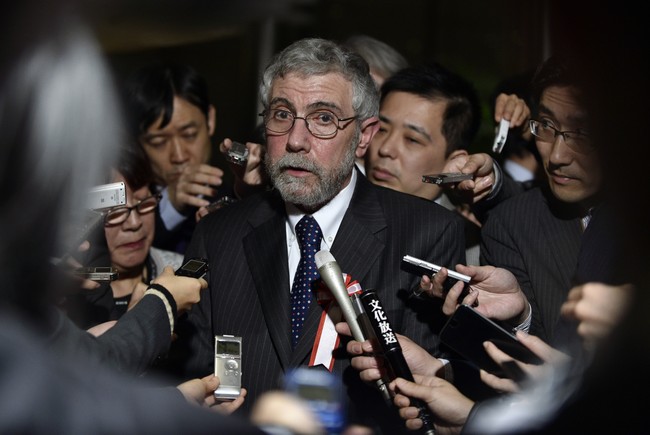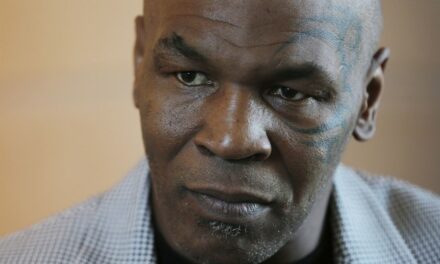We support our Publishers and Content Creators. You can view this story on their website by CLICKING HERE.

Paul Krugman is the James Cramer of opinion writing.
Always wrong, but never in doubt, Krugman’s shtick is to tell liberals exactly what they want to hear and slap the credibility of a Nobel Prizewinner’s credential on top of whatever the fashionable opinion of the day is.
Advertisement
So let me be the first to wish Krugman well as he rides off into the sunset. Don’t let the door hit you in the ass, Paul.
This is a real loss for the moron community. https://t.co/iYSFTFguPY
— John Podhoretz (@jpodhoretz) December 6, 2024
The Time’s announcement that Krugman is leaving is a good reminder of just how arrogant both Krugman and the Times really are. They are treating his departure as a major cultural moment, as did Krugman himself when he wrote his first column.
I want to take you back to Jan. 2, 2000, a day when Y2K was in the rearview mirror and the dot-com bubble burst was just around the corner, when the Dow stood at a mighty 11,500 and a New York Times Opinion columnist debuted on the scene with the first of many prescient arguments and ideas about economics and government.
“Beginnings are always difficult: Even the most tough-minded writer finds it hard to avoid portentousness,” Paul Krugman wrote in his inaugural column nearly 25 years ago. “And since this is a quadruple beginning (new year, new century, new millennium and, for me, new column), I won’t even try. What follows are some broad opening-night thoughts about the world economy.”
That lede and the column were signature Krugman: The authoritative voice. The lively writing. The direct style. The clear hand guiding readers through a thicket of policy, data and trade-offs. The big ideas — in that column, they were about the First Global Economy and the Second Global Economy and how the interplay of political and economic questions would shape life worldwide in the 21st century. In little time, Paul became an essential read in Opinion, helping countless readers become more fluent in and mindful of how trade, taxes, technology, the markets, labor and capital intersected with political leadership, ideology and partisanship to shape the lives of people across America and the world.
Advertisement
It’s true that Krugman did write about all these things, and also true he echoed the transnational elite’s preferred narrative as often as possible. But that meant he was almost always wrong.
Paul is an important figure in the recent history of Times Opinion. Time and again, he took on the big fights, grappled with policy deeply and seriously, held the powerful to account and spoke hard truths — sometimes as a lonely voice arguing unfashionable positions.
I doubt Paul was lonely in his opinions much, given how often they parroted the hopes, dreams, nightmares, and fantasies of the left. As often as not, he would contradict his own academic writings in his columns, and his Nobel Prize-winning work has now been basically repudiated by…Paul Krugman.
Criticizing Krugman is as easy and satisfying as shooting fish in a barrel–good for satisfying your hunger, but hardly sporting.
Paul Krugman is no longer a columnist for the New York Times.
This comes just after Scott Jennings was added to the LA Times Editorial Board.
Nature is healing. pic.twitter.com/I7CwFSR4iN
— Eric Daugherty (@EricLDaugh) December 6, 2024
Over the past few years the famed columnist has spent countless columns explaining to us that Biden’s economy really is amazing, and we are all too stupid to see that. You may think that your purchasing power is plummeting, but you are definitely wrong because Krugman has a Nobel Prize and phony government statistics to back him up.
Advertisement
But Krugman’s best work came right after the election of Donald Trump, when he confidently asserted that the end was nigh, civilization would fall, and Americans would be eating grass and linoleum.
The economic fallout of a Donald Trump presidency will probably be severe and widespread enough to plunge the world into recession, New York Times columnist Paul Krugman warned in a New York Times opinion piece published early Wednesday.
Calling Trump the “mother of all adverse effects,” the Nobel Prize-winning economist predicted that the GOP nominee’s administration could quickly undo the progress that the markets around the world have made in the eight years since the financial crisis.
“Under any circumstances, putting an irresponsible, ignorant man who takes his advice from all the wrong people in charge of the nation with the world’s most important economy would be very bad news,” he wrote. “What makes it especially bad right now, however, is the fundamentally fragile state much of the world is still in.”
That fragile state, you may recall, was the result of the Obama policies that Krugman had been championing until that very moment.
That, my friends, is the essence of Krugman, who can authoritatively state one thing and reverse himself moments later using the same set of facts to create an entirely new narrative.
His column after the victory of Trump was a masterstroke of Krumanisms:
Advertisement
It really does now look like President Donald J. Trump, and markets are plunging. When might we expect them to recover?
Frankly, I find it hard to care much, even though this is my specialty. The disaster for America and the world has so many aspects that the economic ramifications are way down my list of things to fear.
Still, I guess people want an answer: If the question is when markets will recover, a first-pass answer is never.
Stock market futures did take a dip in the hours post-election, but soared on the day after, suggesting that “never” was the wrong answer.
Very Krugman. The world contradicted him as his words were being written.
The exuberance of the markets after the 2024 victory was a mirror image of 2016, suggesting that the smart money follows Krugman’s advice as often as I do.
Krugman’s popularity is explained well in the Time’s announcement of his departure, although they don’t get the joke:
And through the Trump era and the Biden presidency, Paul was ever-sharp about the critical stakes facing the country, not least the threat to democracy posed by Donald Trump and how his plans could radically harm the economy. A few weeks before this year’s election, Paul took a deep dive into Trump’s tariff plans, laying out for readers in clear and urgent writing why his economic policy ideas could do enormous damage to American society. He ended the essay with a classic Krugman kicker, where he summarized the cons of Trump’s tariffs in one graf and then wrote in the final graf, “Pros: I can’t think of any.”
Nick Fox, one of Paul’s editors over the years, said: “Twenty-five years ago, who could have imagined that a column by an expert in economics (yawn!) would become addictive for millions of Americans? Paul made the complex clear, cut through double talk and obfuscation and wrote in the voice of a tough but beloved teacher. It was remarkable that he could write so enjoyably and insightfully as many as four times a week.”
Ezra Klein, who has had his fellow Opinion columnist on his podcast over the years, said: “I don’t know that there’s anyone alive I have read more words from than Paul Krugman. A beacon of clear, moral and inventive analysis for decades now. What a gift his work has been.”
Advertisement
Krugman’s work really is a gift, but only to liberals who want their prejudices elucidated in a manner that makes them appear smart and erudite. They can repeat the words of a Nobel Prizewinner™ and expect to be taken seriously, despite the fact that he is always wrong.
Truth or falsity are irrelevant; they want to express a moral truth, not understand reality anyway.
It is fitting that, as the world breathes a sigh of relief that BAD ORANGE MAN is back to save the Western world, Krugman rides off into the sunset.
There just isn’t much of a market any more for his bloviating. People have moved on and have become reconciled or even giddy that we aren’t living in Paul Krugman’s world anymore, where we are supposed to celebrate an economy as sclerotic as Biden’s.

 Conservative
Conservative  Search
Search Trending
Trending Current News
Current News 







